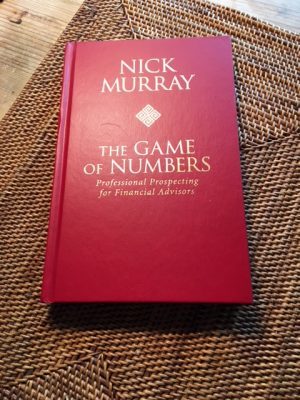Reinforcement and Self-Reinforcement
Let me start with an overstatement:
For writers and artists, the ability to self-reinforce is more important than talent.
What exactly is reinforcement?
It’s when your coach or your mentor or your spouse tugs you aside and tells you how well you are doing, and how proud of you they are, and how certain ultimate success is if you just keep doing what you’re doing.

Nick Murray’s “The Game of Numbers”
That’s reinforcement.
What’s self-reinforcement?
It’s when you do the exact same thing for yourself.
Let me rephrase my original overstatement by quoting my (fictional) literary agent, 96-year-old Marty Fabrikant:
“Talent is bullshit. I seen a million writers with talent. It means nothing. You need guts, you need stick-to-it-iveness. It’s work, you gotta work, do the freakin’ work. That’s why you’re gonna make it, son. You work. No one can take that away from you.”
Self-reinforcement, however, is about more than just patting yourself on the back when your efforts have produced results.
When self-reinforcement really counts is when it’s for actions that have not produced results and may not for a long time.
This is self-reinforcement at the Ph.D. level.
It’s professional self-reinforcement.
Have you read Nick Murray’s book, The Game of Numbers?
If there is one work I would recommend to a young writer after The War of Art, it’s The Game of Numbers.
Full disclosure: Nick Murray is a good friend.
Full disclosure #2: The Game of Numbers costs forty bucks. [Available at Amazon and at www.nickmurray.com.]
But back to Nick and the meat of his concept:
Nick is a guru to financial advisors, the investment professionals that you or I might hire to help us take care of our money.
A big part of succeeding as a financial advisor is the ability to “prospect,” i.e., make cold approaches seeking clients. This is a helluva daunting chore. It elicits MAJOR Resistance among financial planners trying to do it. Many go out of business simply because they can’t make themselves pick up the phone and make the cold calls necessary to acquire clients.
Nick Murray’s answer:
Make five approaches a day, rain or shine, and evaluate your success (i.e., self-reinforce) based exclusively on the fact that you made the approaches, not whether they produced a new client.
It may take 500 calls to get one client. It may take a thousand. But if you keep doing the work, you will get the clients.
The law permits of no exceptions.
Your job is to keep believing. And keep making approaches.
And you, my fellow writers in the trenches, your job, like mine, is to keep doing your pages. And keep believing.
Which brings us back to self-reinforcement.
How do we keep believing?
What keeps us from quitting?
What force stops us from throwing in the towel?
It’s not talent.
It ain’t literary genius.
The ability to self-reinforce is more important than talent.
Believe me, my own gift for the profession of letters is iffy at best. Nine-tenths of my ideas are terrible. I can’t remember the last sentence I wrote that I didn’t have to twist, tweak, and rejigger half a hundred times before I accepted it as ready for public consumption.
But I can self-reinforce.
I can self-validate.
I’ve taught myself over decades.
What is the arena of self-validation? In what inner sphere does self-reinforcement reside?
Its seat is among the most mundane, glamorless, least sexy parts of our psyche. In this place, no champion or mentor stands at our side. Glory has fled. The world is black-and-white. No soundtrack. No audience. No paycheck.
There we stand, a twenty-three-year-old financial advisor (or writer) sharing a $450-a-month office suite with a secretarial service and not even a parking space. It’s seven-thirty at the end of a fruitless day and we’ve just gotten off our fifth total-waste-of-time cold call to a soon-to-be retired dentist or a just-starting-out English teacher, both of whom have hung up on us or, worse, taken pity on our obvious plight and signed off with, “Good luck, buddy.” We turn off the office lights, lock the door, and phone our spouse, telling her/him we’re on our way home.
That’s where self-reinforcement lives.
That’s where we stand when we must call upon our deepest resources.
Can you say to yourself, “I made my five calls,” and keep believing?
Can you tell yourself, “I did my day’s pages,” and hang onto your faith?
In the movies we see courage depicted amid explosions and gunshots and fireballs of violence.
But the artist’s courage (and the financial planner’s) plants itself in a different arena—a sphere that is silent, unseen and unheard, void of glamor or romance, and in which the artist/writer/entrepreneur is profoundly, inevitably, excruciatingly alone.



